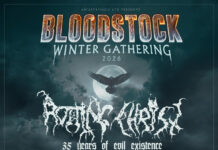Spock’s Beard are now a firmly established presence in the prog firmament, being one of the most consistent and exciting bands, with a whole slew of well-received releases behind them. Now they can add their new release The Archaeoptimist to that lineup, their first album since 2018’s Noise Floor.
This album originally began as a solo project by keyboard player Ryo Okumoto, working alongside Michael Whiteman (I Am The Manic Whale). However, after other members added their input, it made more sense to release it as Spock’s Beard. The Archaeoptimist consists of six pieces, with the eponymous title track clocking in at a mere 21 minutes. You like lengthy prog epics? This one’s for you, featuring everything you’d expect from an extended Spock’s Beard journey. The band has benefited from the inclusion of drummer Nick Potters, who drives the band forward with a powerful foundation while adding his voice to some fine harmonies.
Opening tracks ‘Invisible‘ and ‘Electric Monk‘ suggest that while prog icon Neal Morse may no longer be a member of the band he helped start, his influence and imprint most definitely live on. Similar to the later tracks, there’s plenty of stirring prog being played, all based upon discernible melodies. From here, the songs stretch out, and it’s on ‘Aforethought‘ (not “Afourthought”) where they really expand their wings. After a frenetic guitar/keyboard intro, the band uses vocals to great effect with fine harmonies, tapping into their inner Gentle Giant with gorgeously intricate harmonisation passages. ‘St. Jerome in the Wilderness‘ contains shades of The Flower Kings and marks the first track where the guitar comes to the forefront, with Ted Leonard delivering some fine shredding.
The eponymous title track ‘The Archaeoptimist‘ is an epic twenty-one minutes with multiple key and tempo changes. It tells the story of a young girl being raised by her father in a post-apocalyptic world, charting her journey from inspiration to leader. She’s an optimist, the last of her kind. The key to any lengthy track is whether the listener can take it all in without their attention wandering. That doesn’t happen here; the quite amazing playing on this piece captures full attention throughout. The album closes with ‘Next Step,’ which carries the feel of Kansas in a positive way, where Ryo Okumoto comes into his own with exceptional keyboard work.
There are no weak tracks on this album. Rather, it’s the sound of a band benefiting from ‘new member bounce’ with the inclusion of fresh blood in the ranks. For a band who’ve lost key players like Neal Morse and Nick D’Virgilio to still be able to produce an album of this quality speaks volumes for their creativity.



















